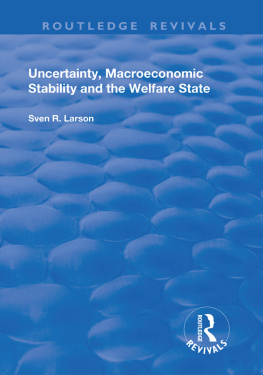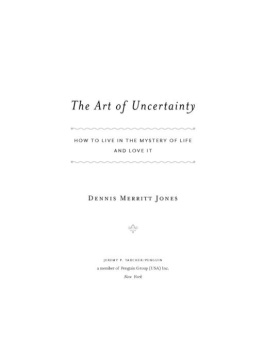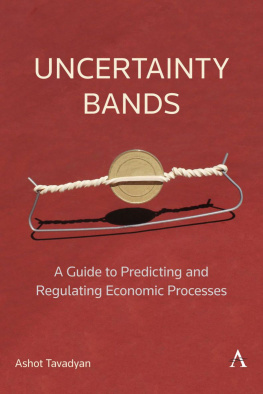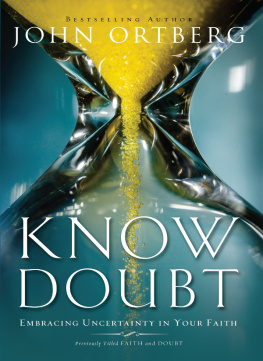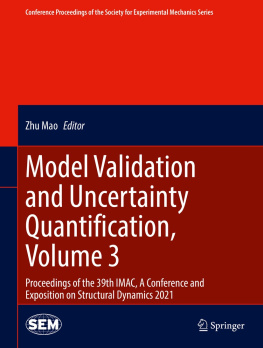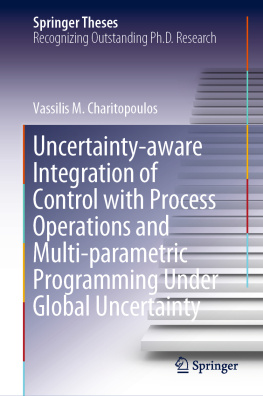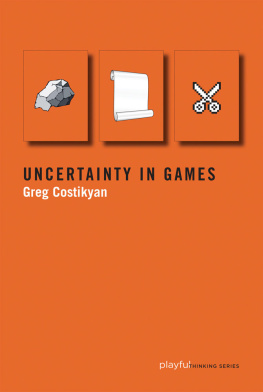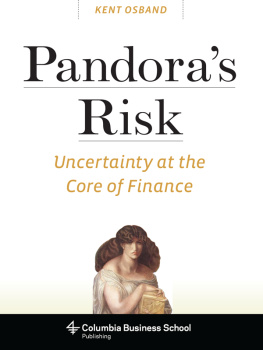COST, UNCERTAINTY, AND WELFARE: FRANK KNIGHTS THEORY OF IMPERFECT COMPETITION
For Liza
Cost, Uncertainty, and Welfare: Frank Knights Theory of Imperfect Competition
STEPHEN JOHN NASH
First published 1998 by Ashgate Publishing
Reissued 2018 by Routledge
2 Park Square, Milton Park, Abingdon, Oxon, OX14 4RN
711 Third Avenue, New York, NY 10017
Routledge is an imprint of the Taylor & Francis Group, an informa business
Copyright Stephen John Nash 1998
All rights reserved. No part of this book may be reprinted or reproduced or utilised in any form or by any electronic, mechanical, or other means, now known or hereafter invented, including photocopying and recording, or in any information storage or retrieval system, without permission in writing from the publishers.
Notice:
Product or corporate names may be trademarks or registered trademarks, and are used only for identification and explanation without intent to infringe.
Publishers Note
The publisher has gone to great lengths to ensure the quality of this reprint but points out that some imperfections in the original copies may be apparent.
Disclaimer
The publisher has made every effort to trace copyright holders and welcomes correspondence from those they have been unable to contact.
A Library of Congress record exists under LC control number: 98071967
ISBN 13: 978-1-138-61117-7 (hbk)
ISBN 13: 978-1-138-61120-7 (pbk)
ISBN 13: 978-0-429-46362-4 (ebk)
Contents
This work comprises an effort to enrich our understanding of Knight by analysing his work as a whole. While Knights vision of economics is not always easy to discern, the effort involved in understanding this view is worthwhile. Not only can we come to understand the things which interested Knight, but we are also drawn to consider the broader aspects of the economic landscape which he surveys.
In contrast to the wide open plains of his homeland, Knight sees a rugged and inaccessible economic landscape. Throughout this economic terrain, uncertainty forces Knight to expand the orthodox conception of welfare economics because a lack of perfect knowledge effectively entraps individuals within separate sociological environments; access to both market knowledge and economic opportunity varies widely between each unique environment. In turn, such diverse circumstances shape the range of choice which is open to the individual so that all individuals do not participate in the benefits which economic progress may deliver (Knight 1921a, 233-63; Knight 1943a, 115).
Indeed, Knights account of how uncertainty segregates individuals shows us that economic freedom is highly diverse. Uncertainty differentiates individuals as well as the economic outcomes which they strive to create. As a result, Knight shows that the orthodox goal of economic efficiency is incapable of incorporating the disparate freedoms and powers of individuals as they exist under conditions of uncertainty. Knight asks economists to supplement the search for allocative efficiency with an examination of both economic freedom and power if they wish to understand why poverty so consistently perpetuates itself (Viner 1958, 134). I hope that both this and the other Knightian problems discussed herein are topics which still concern most economic theorists, because if they do not then we cannot hope to perpetuate the free-market system of exchange.
Throughout this project I have been fortunate to receive assistance from many friends and colleagues. I wish to thank my wife Liza Rybak, for her support and encouragement as well as her editorial assistance with this work. In addition, I would like to express my gratitude to Dr Richard Staveley whose inspirational scholarship prompted me to begin this work. Thanks also to the following scholars at the University of Cambridge from whom I received encouragement: Dr Geoff Hodgson, Dr Tony Lawson, Dr Jochen Runde, and Dr Geoff Harcourt. Moreover, I would like to thank Heidi Rybak, whose comments were both pertinent and beneficial. Finally, I thank the editors and publishers of the following works for permission to reproduce here revised versions of material that earlier appeared in their pages.
American Economic Review: Dorfman. J, 1955, The Role of The German Historical School in American Economic Thought, pp. 17-28; Clark, J.M., 1940, Toward A Concept of Workable Competition, p. 2; Knight, F.H, 1936, Some Issues in The Economics of Stationery States, pp. 393-411; Knight, F.H., 1951, The Role of Principles in Economics and Polities; pp. 1-29; Patinkin, D. 1973, Frank Knight as Teacher, pp. 787-807. Economic Inquiry: Barzel, Y., 1986, Knights Moral Hazard Theory of Organisation, pp. 117-20.Blackwell Publishers, Young, A.A., 1928, Increasing Returns and Economic Progress, Economic Journal, vol. 38. Harcourt Brace and Company: Taine, H., 1976, The Ancient Regime. Harvard University Press: Chamberlin, E.H., 1933, The Theory of Monopolistic Competition. John Wiley and Sons, Inc: Bain, J.S., 1967, Chamberlins Impact On Micro-economic Theory, in R.E. Kuenne (ed), Monopolistic Competition Theory: Studies in Impact. F. B. Knight: F.H. Knight, 1935, The Ethics of Competition and Other Essays. The University of Chicago Press: Knight, F.H., 1921, Risk, Uncertainty, and Profit; Knight, F.H. Bertrand Russel on Power, Ethics, pp. 360-66; Clark, J.M., 1925, Social Control of Business; Pangle, T.L., 1973, Montesquieus Philosophy of Liberalism: A Commentary on The Spirit of the Laws, p. 17; Stigler, G.J. (ed), 1957, Perfect Competition, Historically Contemplated, in Essays in History of Economics; Stone, J, and Mennell, S., 1982, On Democracy, Revolution, and Society; Strauss, L., 1952. Persecution and the Art of Writing; Schumpeter, J.A., 1934, Robinsons Economics of Imperfect Competition, Journal of Political Economy; Patinkin, D., 1973, Frank Knight as Teacher, Journal of Political Economy. Macmillan Press: Stigler, G.J., 1987, The New Palgrave: A Dictionary of Economics. Penguin USA: Dorfman, J. 1949, The Economic Mind in the American Civilisation, Vol 3-5. Yale University Press: Fisher, I., 1906, The Nature of Capital and Income. W.W. Norton and Co: Mansfield, E. 1974, Microeconomics: Theory and Applications.
Economists recognise the theoretical significance of the risk-uncertainty distinction, which Knight delivers in his seminal work Risk, Uncertainty, and Profit (1921a). While this distinction is important, we argue that it cannot be properly understood unless we grasp Knights major contribution to economic theory: the establishment of an alternative theory of welfare economics (Myint 1948, 10). This contribution remains obscure because a broad range of commentators classify it as social philosophy, rather than economic theory. For example, non-economists, such as Allan Bloom (1990), support that classification. As Bloom (1990) says, Philosophy came first, I think, for Frank Knight (Bloom 1990, 198). Similarly, economists such as Breit and Ransom (1982) portray Knight as a social philosopher, resembling David Hume, rather than as an economic theorist (Breit and Ransom 1982, 197-9). We disagree. In contrast, we argue that the methodology which is used to evaluate Knight, rather than the content of Knights work, leads to such a conclusion. This methodology has three basic assumptions. First, it assumes that a valid distinction can be drawn between Knights contribution to economic theory and his contribution to social philosophy. Second, it assumes that Knights risk-uncertainty distinction is his only major contribution to economic theory. Third, it assumes that the overwhelming majority of Knights other published work is social philosophy, being largely irrelevant to economic theory. We disagree with all three assumptions.


